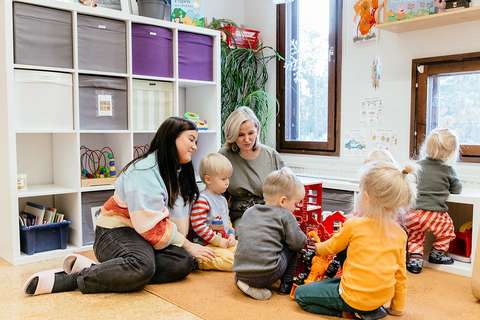Occupational wellbeing is the backbone of educational work

Espoo’s early childhood education units invest in the wellbeing of their directors and employees. A well-functioning work community is built around a sense of community and cooperation.
Occupational wellbeing consists of many elements, including the meaningfulness of one’s work, the atmosphere within the work community, employees’ health, and the safety of the work environment. The City of Espoo’s early childhood education units promote occupational wellbeing, among other things, by investing in the development of management. Employees are also provided with tools for taking care of their own and their co-workers’ wellbeing.
“Each member of a work community has an obligation to promote occupational wellbeing. The management, work community and each individual must work together to build a work environment where people thrive,” says Jutta Karppinen, an early childhood education teacher at Nuottakunnan päiväkoti.
Karppinen says that respect for colleagues and the director as well as gratitude for being able to make a difference in children’s lives increase occupational wellbeing. Also a sense of community and working together are important.
“Our work is often hectic, and some days are challenging. In our team, we have noticed that it is important to talk about difficult situations and come up with ways to make them easier. No one is left alone and help is always available – we are in this together,” she says.
In addition to the solutions created in small groups, the director of each early childhood education unit is responsible for developing practices to make work less stressful. Concrete measures taken at Nuottakunnan päiväkoti include reducing the number and duration of meetings and lightening their content. Learning how to prioritise, taking breaks and reserving enough time for teachers’ planning also promote wellbeing.
“In Espoo, I am supported in my work as a director by my supervisors and the early childhood education administration. It allows me to do my job well, which affects our entire staff’s wellbeing. I feel that we are all one big family, including administration,” says Johanna Fredriksson, the director of Nuottakunnan päiväkoti and Nokkalanpuiston päiväkoti.
Wellbeing is built through interaction
Collegial support and appreciation of each person’s expertise guide daily work at Nuottakunnan päiväkoti. Open interaction and commitment to common practices are at the core of occupational wellbeing. An approachable and encouraging management style is another key element.
“As a supervisor, I support my employees so that they can do their work well. I want to create an open environment where everyone gets to participate and have their say. For me, it is very important to maintain a positive working atmosphere as it promotes wellbeing at work,” Fredriksson says.
Shared values and their importance in practice are discussed with staff. According to Fredriksson, small everyday acts can significantly promote occupational wellbeing. Kindness, praise and encouraging words help maintain a positive atmosphere and show that people appreciate their co-workers.
“The way we talk about things creates our reality. Children learn from us how to interact with others, so we need to set a good example for them,” Karppinen says.
Cooperation with the children’s guardians is an essential part of early childhood education and another area where interaction plays a key role. It is important to look for a solution to possible problems immediately, instead of letting them pile up. The director must have the courage to tackle conflict situations and offer support in problem-solving within the workplace community and with families.
Staff benefits and training motivate employees
The shortage of staff in the field of early childhood education affects occupational wellbeing on a daily basis. The director has to spend a lot of time on recruitment, induction and shift arrangements, while the groups’ teachers and childcarers are struggling due to understaffing.
“We need to have appropriate substitute arrangements in place to ensure sufficient resources in exceptional situations. Thanks to our good workplace atmosphere and warm reception, we are able to find substitutes and know that they want to work here again,” Fredriksson says.
The recruitment of permanent staff is promoted not only by occupational wellbeing but also by a comprehensive induction process. The City of Espoo’s induction plans help an employee get off to a good start in their new workplace. The possibility to develop one’s skills through training also supports employees in their work.
“It is motivating to increase my knowledge. As a teacher, I often want to try many new things at the same time, but it can be stressful. The City of Espoo’s development projects help me focus on one specific theme at a time,” Karppinen says.
The City of Espoo supports early childhood education employees with staff benefits that help them take care of their physical health. Exercise vouchers, free admission to city-owned swimming pools and exercise groups are good ways to stay fit for a job that is often very physical. The city has published instructions on how early childhood education staff can better take care of ergonomics at work. A physiotherapist can also be invited to a workplace to tell employees how they can take care of themselves while working.
“Our staff here at Nuottakunnan päiväkoti share tips with each other on good working positions and other things that make work easier. This is yet another example of occupational wellbeing created through a sense of community,” Karppinen says.
When different areas of occupational wellbeing are in order, it is easier for employees to enjoy their work. Building a workplace culture that supports occupational wellbeing requires the will to experiment, develop and learn.
“Early childhood education has a direct impact on children’s wellbeing. Special attention must be paid to our professionals so that they can do their valuable work in the best possible way,” Fredriksson says.
Text: Maisa Lampinen